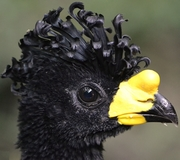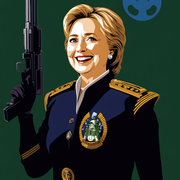|
computer parts posted:25% is about the "will vote for a Ham Sandwich with -R next to its name" level here. Must be a bipartisan system thing, the opposition is united in Venezuela?
|
|
|
|

|
| # ? May 19, 2024 02:56 |
|
Is "Socialism of the 21st Century" the name they've come up with for whatever the hell it is they are doing?
|
|
|
|
Randarkman posted:Is "Socialism of the 21st Century" the name they've come up with for whatever the hell it is they are doing? Yes. Chavez coined the phrase back a long time ago. An interesting point to consider is how badly that brand has been soiled by Maduro. I'm not suggesting that Maduro is solely responsible for what's happening in Venezuela today, because I think it's clear that the unraveling that we've seen in the last two years is largely due to the accumulated effects of many of Chavez's policies. But it'll be interesting to see if people will be able to get the bad taste out of their mouth whenever Maduro leaves and give "socialism of the 21st century" another go, or if they'll forever equate it with Maduro's absolute failure at the helm.
|
|
|
|
I've wondered for a long time if Chavez didn't predict the collapse of his government and nominated Maduro as his successor just to place the blame on him and live on as a great visionary. Why would you nominate Maduro otherwise, dude is a clown.
|
|
|
|
computer parts posted:25% is about the "will vote for a Ham Sandwich with -R next to its name" level here. Actually remarkably close.
|
|
|
|
Hugoon Chavez posted:I've wondered for a long time if Chavez didn't predict the collapse of his government and nominated Maduro as his successor just to place the blame on him and live on as a great visionary. I think Chavez nominated Maduro because he knew that the other strongman, Diosdado Cabellos, is a far darker and more dangerous person. Maduro is probably not as actively evil / corrupt. Maduro was probably more of a psychophant to Chavez as well.
|
|
|
|
Tony_Montana posted:I think Chavez nominated Maduro because he knew that the other strongman, Diosdado Cabellos, is a far darker and more dangerous person. Maduro is probably not as actively evil / corrupt. Maduro was probably more of a psychophant to Chavez as well. Well, you're right on that regard, Cabello would've turned it all in a straight up militar dictatorship.
|
|
|
|
An interesting data point: an NPR article about another topic entirely refers to Venezuela as an "authoritarian country" simply in passing, as an established fact even among the left-leaning NPR audience. http://www.npr.org/2015/10/05/445989338/univisions-jorge-ramos-discusses-journalism-and-that-donald-trump-press-conferen
|
|
|
|
25% is actually not that much for such a polarizing candidate. It leaves me hopeful that the Venezuelan electorate will get rid of the chavistas come December. My only fear is that they will try every trick in the book, if not to outright throw the election, then at least to invalidate the results.
|
|
|
|
There have been two stories over the past week or so that have stirred up quite a reaction, and they both deal with things PSUV officials have said. On Saturday, Minister of Communication Jacqueline Faria was at an event in Caracas speaking to supporters. I believe that the event was a food distribution drive. Anyway, Faria spoke to the crowd on the multi-hour long lines Venezuelans endure when they go shopping for food, and said: quote:You leave your house, come here with your bag, buy things and then head home (…) this is the revolution, what our President Maduro has ordered. Asi que vamos a disfrutar de estas colas sabrosas para el vivir, viviendo. [I believe this sentence can be best translated into English as, “So, let’s enjoy these awesome lines to live well”]. Commentators were quick to point out that baking under the sun in line at a supermarket hoping to get lucky and find a single bag of corn flour isn't something Faria has to worry about. Here's a picture of a line outside the Unicasa supermarket in La Candelaria, Caracas taken on that same day:  Last Tuesday, the governor of Bolivar state, Francisco Rangel Gomez, was doing his radio show when he started to talk about the scarcity crisis in the country. He warned PSUV supporters not to be tempted to vote for the opposition in the Parliamentary elections, and said: quote:We should be really careful [because] they [the opposition] will take whatever they want away from us. We’re capable of eating sticks or, instead of using eggs, throwing two rocks [on a pan] and eating fried rocks, but we will never bow down to anyone or anything. I think it says quite a bit that the PSUV is resorting to using the scarcity crisis as a rallying point to somehow try to convince people to keep voting for them. I mean, it doesn't make any sense, but the fact that they're finally acknowledging the problem and trying to spin it any way they can means that they understand it's so severe that they just can't keep ignoring it completely. Phlegmish posted:25% is actually not that much for such a polarizing candidate. It leaves me hopeful that the Venezuelan electorate will get rid of the chavistas come December. My only fear is that they will try every trick in the book, if not to outright throw the election, then at least to invalidate the results. There's all kinds of shenanigans going on already. For starters, there's a group of opposition candidates who've been banned from holding office. The latest addition to that list is Carlos Vecchio, who was invalidated as a candidate just a few days ago. The list stands at around six now, I believe. There's also the issue of the refusal to allow observers from the European Union and the Organization of American States because "Venezuela se respeta!" or whatever catchphrase the PSUV decided to throw at the issue. Also, the Consejo Nacional Electoral has been playing musical chairs with the voting centres, closing some down or opening others without providing any kind of justification. All that, plus the whole "state of exception" business that continues to affect somewhere around 23 municipalities along the border with Colombia. As Labradoodle pointed out earlier, some of those municipalities are close races. Chuck Boone fucked around with this message at 02:22 on Oct 8, 2015 |
|
|
|
Does anyone seriously believe that the PSUV will in any way allow a fair election? Any canidate that might pose a serious threat will be barred from running, and if anyone looks like they'll win anyways they'll be arrested on trumped up charges, or the PSUV will blatantly steal the election.
|
|
|
|
-Troika- posted:Does anyone seriously believe that the PSUV will in any way allow a fair election? Any canidate that might pose a serious threat will be barred from running, and if anyone looks like they'll win anyways they'll be arrested on trumped up charges, or the PSUV will blatantly steal the election. I don't think anyone but the most delusional diehards (Salon and leftwards) thinks the elections can be legitimate given what's happened already. Viable opposition candidates are imprisoned or disqualified and armed paramilitaries intimidate voters at the stations. We could parse out the sort of gentle fudging that is inherent in making voting stations much more accessible in pro-government areas, or wonder about who controls the tabulation machines, but why bother? What we already know is more than enough to say that Venezuela is no longer a democracy.
|
|
|
|
Over the last two nights, residents of a neighbourhood in the city of Guarenas (just east of Caracas) have been protesting due to ongoing failures in the city's electrical and water systems. These are some pictures from last night's protest:   NTN24 uploaded a video showing some of the response by the National Guard to the protests. The second half of the video shows what appear to be National Guard soldiers shooting (what is most likely rubber shotgun pellets) at residential buildings: https://www.youtube.com/watch?v=F2O_mdNqlUA M. Discordia posted:I don't think anyone but the most delusional diehards (Salon and leftwards) thinks the elections can be legitimate given what's happened already. Right on. Regardless of what happens on December 6 at the voting centers, enough has happened already to completely undermine the fairness of the election.
|
|
|
|
I got a few friends there and they're having a rough time. Caraqueños (people from Caracas) are not as used to blackouts and water outages as the rest of the country since they've had far less, but things are pretty bad in Guarenas in the last month. Another city, Valencia, has at least two power outages a week. I got a friend there that's getting buffed as gently caress because he goes to the gym everytime there's an outage. At least he gets something out of it because the poor dude has the worst luck with outages and has had one while getting a tattoo, cooking, bathing and in the hospital with his dad. Keep in mind that, being as insecure as it is, Caracas (Venezuela, really) with the lights off is really loving scary. I've been in a few blackouts there before they were as common and it's frightening if it catches you on the street. People already try to be home before dark, now with sudden blackouts they're twice as scared. Valencia was a ghost town after 7 this February when I went there, and I did eat two power outages in the four days I spend there. By the way, I don't know if my real-life anecdotes are interesting to you guys or proper to the thread. I understand it's a subforum about politics and my stories are a bit off target, but I think reading about how real Venezuelans live and think helps put things in perspective. Also, Chuck Boone, thanks for being so active and on point in the thread. I'm not into politics or mindful of news as much as I could/should be, but I really appreciate you sharing the info, translating and in general helping out a tiny bit to let the true state of my country be known. It's not as bad as the Chavez' days but there are still a lot of people that romanticize Chavism without having a clue of what it has meant for the people under it and I think it's important to get this information out there and shine the llight on what Chavismo really is. Labradoodle, you too. If any of you are ever in Madrid I'll hook you up with an Arepa.
|
|
|
|
Definitely keep posting them, having a man on the street perspective is a good thing for this thread.
|
|
|
|
A story from earlier this year re-surfaced onto the news cycle this week and it looks to have some telling implications for the Parliamentary elections. The National Assembly recently announced that an unspecified number of Tribunal Supremo de Justicia (the country's top court) justices would be retiring before the end of the year. José Peña Solís, a former TSJ justice, told El Nacional that the move is alarming not only because of its vagueness, but also because justices should not be able to retire until the new National Assembly is in session. Solis said: quote:The National Assembly is acting suspiciously by prematurely by calling for candidates to replace those who will retire. It looks as if they’re acting out of fear that the opposition will win an absolute majority in the Parliamentary elections and assign new justices next year. It’s an advanced retirement. We don’t know the exact situation of the ones who will retire, but there was also little clarity in the way the call for candidates was announced. [We don’t know] how many vacancies there will be, and to which chamber they belong. This story first broke in July when a man named Jose Luis Pirela, the head of a party called Movimiento Progresista de Venezuela, said that he had been informed that the government was placing "undue pressure" on TSJ justices to resign this year, and that as many as 14 had agreed to do so. The TSJ is made up of 32 justices. On Tuesday, a court in Caracas issued an order to detain and bring before the court a number of individuals Diosdado Cabello is suing for reporting on a story earlier this year that linked Cabello to a drug trafficking organization. As far as I can tell, it's not anything like an arrest warrant: it's simply an order to bring defendants in this lawsuit before the court. There's a total of 13 individuals on the list, including the heads of three big media outlets: El Nacional (Miguel Otero), La Patilla (Alberto Federico Ravell), and Tal Cual (Teodoro Petkoff). The order is here (in Spanish) if you want to take a look at it. Last night, the CICPC (the country's investigative police body) went to the headquarters of El Nacional to look for Otero, but he wasn't here (he's actually not in the country). What's interesting about the case is that the Cabello-drug-trafficking story broke in Spanish media (and similar reports later appeared in The New York Times), and that the Venezuelan media simply reported on the reports. Cabello took issue with it, and now he's suing a bunch of people over it. Hugoon Chavez posted:By the way, I don't know if my real-life anecdotes are interesting to you guys or proper to the thread. I understand it's a subforum about politics and my stories are a bit off target, but I think reading about how real Venezuelans live and think helps put things in perspective. Please keep posting them. It's great to have that perspective, like Troika said. And, it's my pleasure. I'm working on Venezuela full time now, so even when the thread slows down I'm keeping up with things. I will definitely take you up on that arepa one day because they are just the best.
|
|
|
|
Be honest (current and ex) Venezuelans. How likely do you think that the PSUV will be voted out this December?
|
|
|
|
punk rebel ecks posted:Be honest (current and ex) Venezuelans. How likely do you think that the PSUV will be voted out this December? I'm 100% sure PSUV won't get the majority of votes. Now being voted out, we'll have to see. I don't see them either peacefully giving up their power, or dropping the facade for the TSJ elections and keeping it by force (if anything, this will happen when Maduro is force out. There should be a Referendum in 2016 for this.) It's more likely they'll try to trick their way into holding the seats (as Chuck Boone's latest post hints).
|
|
|
|
punk rebel ecks posted:Be honest (current and ex) Venezuelans. How likely do you think that the PSUV will be voted out this December? Given it's becoming common to bid farewell with a variation of "At least we're sure of who we're (not) gonna be voting for this December the Sixth!"after the customary "Current Situation" Topics are talked and how everyone groans in perfect unison when an outage happens (And I have to point out the electrical situation in Valencia has diverted a bit from Hugoon's experience: we've been having three hours or longer lasting outages every non-weekend day for the last three weeks) which usually lead to said conversations, it's quite easy to see there's not much actual support for them. So the PSUV will most likely fall hard to their usual tactics in order to win: trying to buy the voters with food and electrodomestics, changing people's Voting Circumscriptions suddenly two states away (if not farther) from their Residence (and thus being to forced to either spend a weekend in a location they might not be familiar to vote for a candidate that might not be relevant to their daily lives or abstain), using the Abstained Vote to arrange the numbers to their favor, forbidding any review request for the Voting Centers' Voter Registry Books (Physical Lists which hold the signatures of whoever actually went to vote in the Center during the Election) so no one can prove the previous point even though the speed they have them destroyed makes it more suspicious and among other trickeries and intimidation acts during Election Day...
|
|
|
|
punk rebel ecks posted:Be honest (current and ex) Venezuelans. How likely do you think that the PSUV will be voted out this December? I think their recent move regarding the Supreme Justices provides a clue: it lessens the impact of an opposition majority in the National Assembly, so they don't expect their tricks to be enough to swing the vote. Now, even with an opposition majority the PSUV wouldn't simply implode. They'd still have a stranglehold on most other Venezuelan institutions and unless some major chavista players panic and start jumping ship, I don't see them just deciding to roll over and let the oppo do a clean sweep, they simply have too much to lose. My guess is they'll continue to do everything in their power to shorten the gap before 6D, ignore legality to reduce what the opposition could actually accomplish when they take their seats, maybe ban a few more opposition politicians from running and attempt to bribe them to jump sides. On the other hand, I'm sure they must be considering the possibility of outright fraud, since they're dead set on not allowing international monitoring of the elections and moves such as the forced resignation of the Supreme Justices could be just them covering their asses in case they decide that large scale fraud would be too risky.
|
|
|
|
punk rebel ecks posted:How likely do you think that the PSUV will be voted out this December? That's the Bs. 718,650,000 question. If an election were held freely and fairly, the PSUV would lose handily, full stop. Since early this year, the polls have been unequivocal on this issue. The PSUV has no more than 25% support. Voting intention is around the 80% mark. As battered as the Venezuelan electoral system is, this time around people seem to have faith that it is their best chance at putting a dent on the people that are causing the misery they experience each day. However, for reasons that have already been pointed out in the thread, these elections have not been free nor fair so far. The question is, "How much cheating will the PSUV have to do in order to win?". I think the answer is, "More than they've ever done", because the reality they have to overcome is so great this time. Selling a PSUV victory as the result of a free and fair process would be extremely difficult, and I'm not sure most people would swallow it. It's already been mentioned in the thread that the cheating started long ago: the arrest of political opponents, disqualifications of opposition candidates, daily claims by PSUV officials that the opposition are terrorists bent on destroying the country, the declaration of states of exception to severely limit civil liberties, etc. Throw in the fact that PSUV candidates have virtually unlimited campaign resources via state coffers and a monopoly on state television and radio, and the fact that the playing field is anything but level is obvious. If the gap between the PSUV and the opposition was smaller (say, 5% or even 10%), I think that those tactics might be enough to push the PSUV over the top. However, we're looking at a gap of at least 45% here, and that's not something that can be overcome easily. How far they're willing to go is something we'll have to wait to see. This is a really tough situation to read because the PSUV is so confident in victory that I wonder what they have up their sleeve. For example, this is what Diosdado Cabello said yesterday: quote:We are going to win, and we are going to give them a beating. They think that the people - who might have reason to be upset - will come out and vote for an escualido [derogatory term for opposition member]. That will never happen. Chavistas have conscience, and no matter what happens they will go along with the Bolivarian project and Commander Chavez. We have to assume that Cabello knows what the polling numbers look like. Why would he stick his neck out by saying something like that? Is he just bluffing? Or does he know something we don't? On Tuesday, Maduro went on television and said that he wanted to sign an agreement with the opposition to respect the results of the election, no matter what. The opposition came right back and said that they weren't interested in signing anything with someone whose word, as the head of the MUD put it, "means nothing", and instead called on the national government to allow observers from the Organization of American States and the European Union, something Maduro has denied out of hand. In this case, the same questions apply: Why would Maduro do that? Is he betting on the opposition to reject the call so that he can score cheap political points, or does he know something we don't? An entirely different rabbit whole reveals itself when we consider what role intra-PSUV fighting might play in all of this. It might be the case, for example, that Diosdado Cabello could see a defeat in December as beneficial to him because it might help to remove Maduro from the picture, allowing him to run for President in 2018. On the other hand, as Labradoodle just pointed out, the fact that they appear to be preemptively mitigating damage of a defeat by the shuffling going on at the TSJ means that they may be fully aware that they're going to lose. In short, I really have no idea what's going to happen on December 6. AstraSage posted:So the PSUV will most likely fall hard to their usual tactics in order to win: trying to buy the voters with food and electrodomestics... I read a really interesting piece about this earlier this week. El Nacional had an article on Thursday about how the PSUV campaign was rolling into government ministry offices with bags of groceries for sale at subsidized prices. A grocery bag with two chickens, a cut of Nicaraguan beef, rice, pasta, cooking oil, sugar, corn flour, milk and margarine sold for Bs. 1,400 at these food-for-votes drives. El Nacional quoted one of the employees at a government office where they sold the bags as saying: quote:They surprised us at work with a bag of groceries. However, we’re well aware that this is all looking forward to the Parliamentary elections. Another employee pointed out how futile and short-sighted the initiative is: quote:The bag helps for a little bit with the lines, but I still have to line up to buy cleaning and personal hygiene products, diapers and sanitary napkins. If they think I’m voting for them because of this bag, they’re wrong. The same article quotes the head of the Union Nacional de Trabajadores [National Worker's Union], Serbando Carbone, as saying: quote:The government thinks that it's buying the conscience of public employees with these initiatives, but they [public workers] understand fully that the ballot is secret. Similarly, the head of the Union de Accion Sindical [Syndicate Action Union] said that these kinds of grocery drives "betray the working class" because "no one in Venezuela earns a decent wage because of inflation".
|
|
|
|
It looks like the Wikileaks cables have confirmed that the right wing opposition is in the U.S.' pockets https://www.jacobinmag.com/2015/09/latin-america-wikileaks-hugo-chavez-rafael-correa-obama-venezuela-intervention/ quote:Earlier this summer, the world watched Greece try to resist a disastrous neoliberal diktat and get a painful thrashing in the process.
|
|
|
|
I like how one of the passages you decided to bold for us is the one that says "we found literally no evidence to support our accusations but we're making them anyways".
|
|
|
|
quote:In Venezuela, where a dysfunctional currency control system has generated high inflation, violent right-wing student protests seriously destabilized the country. I think there may have been a little more to it than that. Also that article makes a hell of lot of unsupported assertions for what is supposed to be a serious investigative piece. But hey that's Jacobin for you. Bro Dad fucked around with this message at 21:12 on Oct 11, 2015 |
|
|
|
The Larch posted:I like how one of the passages you decided to bold for us is the one that says "we found literally no evidence to support our accusations but we're making them anyways". that's even more suspicious
|
|
|
|
Bro Dad posted:I think there may have been a little more to it than that. You'd think they'd start switching to bashing Maduro while continuing to praise Chavez if the really wanted to keep that dream alive, because the situation is somehow going to get more indefensible after the elections. I understand the need to believe that there is actually a decent, fair regime out their somewhere keeping the flame of the revolution alive, especially through the neoliberalism of the past 20+ years, but you have to accept reality at some point.
|
|
|
|
Bro Dad posted:I think there may have been a little more to it than that. Much like there was "a little more" to white supremacist paramilitary groups attacking African Americans during reconstruction.
|
|
|
|
Guys, the likelihood that Borneo Jimmy is receiving PSUV funding and / or training is extremely high.
|
|
|
|
beer_war posted:Guys, the likelihood that Borneo Jimmy is receiving PSUV funding and / or training is extremely high. Only in as much as PSUV funding is slang for no money, and PSUV training is slang for "clinical stupidity".
|
|
|
|
I can certainly agree with the second part.
|
|
|
|
Hey Borneo Jimmy if you want you can stay at my mom's in Caracas since obviously Venezuela is such a paradise. She can even explain how to get to Petare so you can see what a magnificent land of opportunity it is, be sure to bring a bunch of papers about the right wing conspiracy so you can make friends with all kinds of wonderful people, and the iPhone with which you post so you can keep us updated. Please take the offer.
|
|
|
|
Hugoon Chavez posted:Hey Borneo Jimmy if you want you can stay at my mom's in Caracas since obviously Venezuela is such a paradise. Again I never said Venezuela is perfect, and I am well aware of the serious issues stemming from right wing economic sabotage and terrorism. Its still far better than Latin American countries under pro U.S. Neo-liberal regimes like Mexico and Honduras which are basically failed states where people are regularly murdered by the military and government supported drug cartels. Borneo Jimmy fucked around with this message at 05:44 on Oct 12, 2015 |
|
|
|
I mean even if it is true that the U.S. is supporting the right wing...so what? I'm pretty sure most major parties in developing countries are in the pockets of more industralized countries. You don't think the PSUV receives foreign checks as well? Political parties take money when they can get it.
|
|
|
|
beer_war posted:Guys, the likelihood that Borneo Jimmy is receiving PSUV funding and / or training is extremely high. These days I'm pretty sure PSUV funding comes in the form of little reddish-brown slips of toilet paper with simon bolivar's face on the front
|
|
|
|
M. Discordia posted:An interesting data point: an NPR article about another topic entirely refers to Venezuela as an "authoritarian country" simply in passing, as an established fact even among the left-leaning NPR audience. NPR have been on the road to neoliberal corporate sell-outs for a long time now, thanks to public funding being slashed. Not that Venezuela isn't an authoritarian country though
|
|
|
|
punk rebel ecks posted:I mean even if it is true that the U.S. is supporting the right wing...so what? I'm pretty sure most major parties in developing countries are in the pockets of more industralized countries. You don't think the PSUV receives foreign checks as well? Political parties take money when they can get it. Financing opposition political parties directly would be illegal, but no one has even claimed that so far. On the other hand, it's a matter of public record that Spanish multinational bank BBVA financed the Chávez campaign back in 1998: quote:Goirigolzarri informed then-chairman Ybarra about the request, who later authorized a US$1.5mn payment to the Chavez campaign. Another political contribution was also paid later during the elections to Chavez's special legislative assembly. http://www.bnamericas.com/en/news/banking/BBVA_CEO_also_knew_of_Chavez_campaign_financing
|
|
|
|
punk rebel ecks posted:I mean even if it is true that the U.S. is supporting the right wing...so what? I'm pretty sure most major parties in developing countries are in the pockets of more industralized countries. You don't think the PSUV receives foreign checks as well? Political parties take money when they can get it. The PSUV takes big checks from China. They havn't even been trying to hide it.
|
|
|
|
Borneo Jimmy posted:Again I never said Venezuela is perfect, and I am well aware of the serious issues stemming from right wing economic sabotage and terrorism. Its still far better than Latin American countries under pro U.S. Neo-liberal regimes like Mexico and Honduras which are basically failed states where people are regularly murdered by the military and government supported drug cartels. I'm going to assume you live in the US. Isn't it better to go live in a country that's fighting the Right-Wing? Be part of the change! Join the Chavism and the 21st century Socialism, stop being an armchair communist and become a soldier of the revolution, come on! I'm sure that you're not the kind of guy that claims he knows what's really going on and idolizes the Chavist movement, from the comfort of a right-wing, first-world country. Surely living alongside the champions of your cause is worth giving up a few commodities.
|
|
|
|
Hugoon Chavez posted:I'm going to assume you live in the US. Isn't it better to go live in a country that's fighting the Right-Wing? Be part of the change! Join the Chavism and the 21st century Socialism, stop being an armchair communist and become a soldier of the revolution, come on! I've already found him some deals: https://www.priceline.com/fly/#/sea...code=US&v=ALLOW $214 to be part of a revolution!? Deal of a life-time! Remember, you can live in a goon's mom's house and get eternal free food and luxuries from lord Chavez (his soul never dies), especially since you will be part of his cause. punk rebel ecks fucked around with this message at 11:18 on Oct 12, 2015 |
|
|
|

|
| # ? May 19, 2024 02:56 |
|
Whatever the US might be trying to do has clearly backfired for decades since the entire south american population is in an anti-usa fever, just ask anyone in the continent and you will confirm this. That article is really lazy though, it tries to simplify things into a "rebel vs empire" story. These so called revolutionary leaders that you defend don't actually stand in those "sweet lines for food" with the people. They're missing the revolution! Living in their mansions watching the people protest below, what an eccentric choice. There are several socialist parties with very different approaches, if the short sighted chavist approach failed, there might be some other socialists who who might be more successful in not screwing everyone over. It's doable.
|
|
|





















